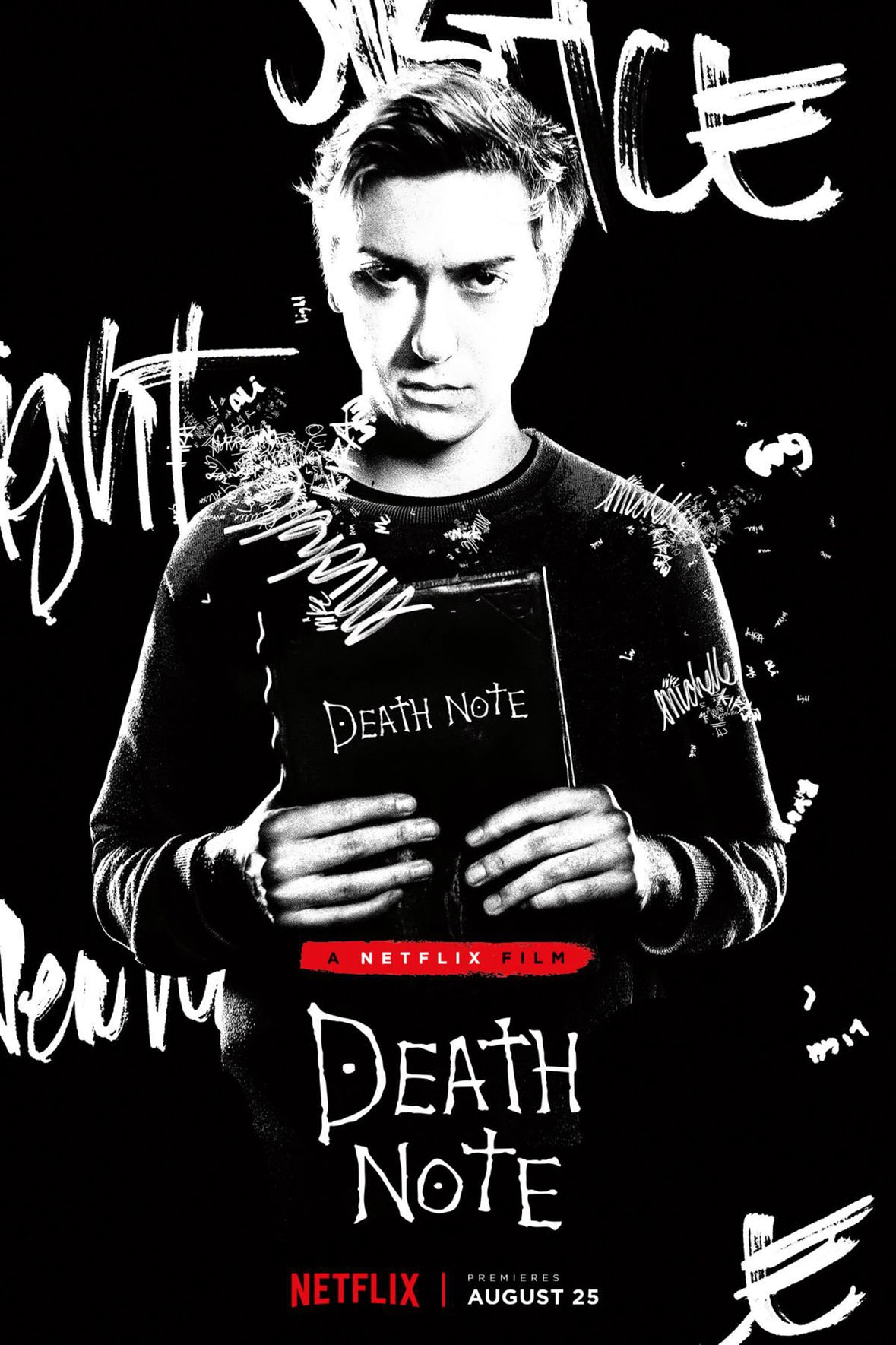DEATH NOTE (NETFLIX) (2017)
SYNOPSIS: Based on the famous Japanese manga written by Tsugumi Ohba and Takeshi Obata, Death Note follows a high school student who comes across a supernatural notebook, realizing it holds within it a great power; if the owner inscribes someone’s name into it while picturing their face, he or she will die. Intoxicated with his new godlike abilities, the young man begins to kill those he deems unworthy of life.
MOVIE REVIEW:
If you’re already biased against a Western adaptation of Tsugumi Ohba and Takeshi Obata’s bestselling Japanese comic book, then you should not even bother with this Netflix-backed film. Oh yes, we are quite sure purists will not be pleased by Adam Wingard’s interpretation of the manga series that has seen five big-screen interpretations, which despite being immensely watchable from start from finish, has its fair share of flaws that will undoubtedly be picked on by its fans.
The setting is now Seattle, and Light (Nat Wolff) a smart but socially isolated high-schooler who spends his time doing his schoolmates’ homework in exchange for cash. He is at the schoolyard watching his crush Mia (Margaret Qualley) and her fellow cheerleaders practise their routines when suddenly the clouds darken and an ancient leather-bound notebook falls from the sky. It isn’t clear why Light was chosen or why he chooses to keep the notebook for that matter, but before he can make it safely back to the school building as the skies open, he is knocked cold by a bully whom he stumbles upon picking on another kid.
And so Light has his first potential target, a teenage do no-gooder who doesn’t care as much about the fact that he has been held back twice in the same grade than the next kid ripe for the picking (on). Even for those who know how it works, Wingard’s setup of the rules of the notebook is intriguing and exciting to watch, in particular because Wolff successfully channels the curiosity, trepidation and sheer thrill of someone realising the tremendous power that has just fallen into his hands. There is also Ryuk of course, the ‘shinigami’ death god voiced with crackling relish by Willem Dafoe, whose sardonic one-liners give the film added bite especially when taunting Light to try out the powers of the notebook.
Light’s maiden ‘kill’ turns out to be a gruesome decapitation befitting of the ‘Final Destination’ movies, i.e. a string of random accidents that build into a chain reaction which eventually result in a grisly end for the intended victim. More so than any of its Japanese counterparts, this ‘Death Note’ is not for the faint-hearted – his next target impales himself on a steak knife while at a fine dining restaurant and his subsequent one is run over by a SWAT vehicle in broad daylight. Wingard executes these executions with style, and those who love their violence with a fair share of gore will no doubt delight at the gloriously lurid death scenes.
Unfortunately, these flashes of gory brilliance cannot quite disguise the narrative shortcomings in Charley Parlapanides, Vlas Parlapanides and Jeremy Slater’s script. Without quite setting the stage for his surrender to godlike power, Light suddenly embraces his newfound vigilante powers by writing the names of criminals from his dad’s computer database as well as international terrorists on the news inside the notebook and attributing the kills to a ‘Lord Kira’. Without much sleuthing too, Light’s arch-nemesis L (Lakeith Stanfield) suddenly deduces that the real killer is none other than Light, choosing then to confront Light in his own house and forcing Light to go on the run with Mia.
Whereas the Japanese versions sketched a gripping cat-and-mouse between Light and L, that here hardly passes muster, in turn making L’s signature eccentricities – whether is it crouching on chairs, or hiding his face under his favourite black turtleneck outfit, or sucking on candies non-stop – appear unnecessary and worse caricatured. Oh yes, both come off equally petulant and childish; and while that may be the intention for Light, it certainly can’t be for L, especially when we are asked to believe that the local police would simply cede their authority and resources at his disposal so readily. More compelling is the dynamic between Light and Mia, the latter (more than L) the wild card whose own fiendish motivations threaten to undermine Light’s own as the movie progresses.
There is yet another dynamic that proves more interesting than that between Light and L, and that is the relationship between Light and his police detective dad James (Shea Whigham). In a shrewd departure from the source material, Light is given an additional backstory that has him frustrated by the law for not convicting the driver of the vehicle who killed his mother in a hit-and-run a couple of years ago, which sets him on his path of increasingly perverted justice. Father and son will eventually reconcile all right, but it is nonetheless a nice poignant angle that differentiates this big-screen adaptation from its predecessors.
Like we said at the start, ‘Death Note’ does have its fair share of flaws, most notably a rushed narrative that seems to prioritise pacing over plotting and character development. But there’s no denying that it remains engaging through and through – not just for those who haven’t yet encountered the ‘Death Note’ pop-culture phenomenon, but also for those who are not inherently biased against a Westernised take on this Japanese creation. If you ask us, there’s been plenty of culture appropriation going on long before we started to be so allergic to it, and if you’re just looking for some good-old edgy entertainment, you can do a lot worse than this stylishly macabre movie.




Review by Gabriel Chong

